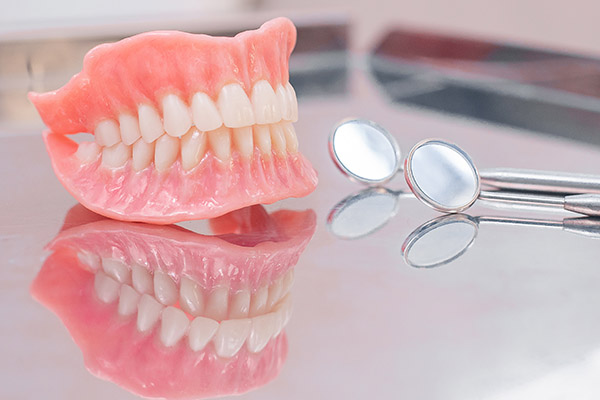 Whether to take your dentures out or keep them in all the time is a common dental question that arises about denture care. It is important to note that proper denture care starts with removing your dentures for at least six to eight hours daily. The best time for this period to occur is overnight when you are sleeping. Why should you remove your dentures? Let’s take a look:
Whether to take your dentures out or keep them in all the time is a common dental question that arises about denture care. It is important to note that proper denture care starts with removing your dentures for at least six to eight hours daily. The best time for this period to occur is overnight when you are sleeping. Why should you remove your dentures? Let’s take a look:
Health consequences
Dentures put pressure not only on your gums but also on the various boney ridges that are under them. This can cause reabsorption, which will result in a gradual decrease in the bone density and volume in your jaw. Bone loss and the process of reabsorption can happen quickly if dentures are worn 24/7.
When there is bone loss in the jaw, this becomes an inadequate support structure for your dentures, resulting in them becoming loose and falling out. Not only will this affect how your dentures fit, but this will also affect your physical appearance. Dentures that do not fit properly can cause less support for your cheeks and face, resulting in dramatic changes and a sunken appearance.
Taking care of your dentures first
If dentures are not properly cared for, this creates a breeding ground for the surfaces in your mouth for bacterial and fungus. Not only will this cause bad breath, halitosis, but it also can cause irritation and even infections. Studies have shown that those that wear their dentures 24 hours a day, even when they sleep, are at a higher risk of developing denture plaque, denture stomatitis (inflammation), and even thrush (an oral yeast infection). Good oral health with denture wearers is essential to reducing your risk of developing other health conditions and keeping any chronic conditions you may already have under better control.
Take them out at bedtime
Whether you use a partial or complete denture, you should take them out to give your gums and mouth a chance to recover. Removing dentures for six to eight hours a day is one of the best and healthiest things you can do. Most dentists recommend removing them for this period when you are sleeping, as you are mostly unaffected by not having your teeth in during this period.
Good oral hygiene
You should also follow a good oral hygiene routine in addition to removing your dentures daily. You will want to make sure you remove and rinse your dentures after every meal and brush at least twice a day with a soft-bristled denture toothbrush. You can use mild soap or a dentist-approved denture cleanser. Store your dentures in water or a denture cleaning solution when not in use to help them maintain their shape and durability. Do not forget, if you use a denture adhesive, make sure you do your best to remove this before you store your dentures so there are no hardened materials left in the grooves and crevices, which could cause breakage.
Related Posts
Whether you can use toothpaste for denture care is a common question many people wonder when they first get dentures. The short answer to this question is no; you cannot. But why is it that you can’t use toothpaste on dentures? Let’s find out.Dentures are made of a less sturdy material than your natural teeth.…
We all want to keep our teeth and gums healthy, but sometimes it's difficult to properly do denture care while enjoying the foods we love. The foods we consume can make a big difference in how well our dentures fit, so avoiding certain food items is an important step for easy denture care. Dentures are…
Denture care is the maintenance of dentures with respect to proper denture placement and denture hygiene. Good denture care and placement involves both denture security on your part but also ensuring that dentures fit correctly in your mouth so that they don't cause any physical obstruction when it comes to eating or speaking. When removing…
